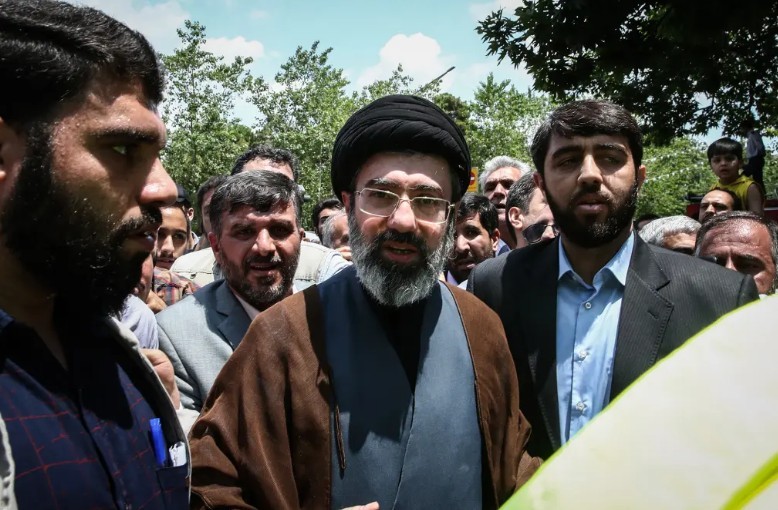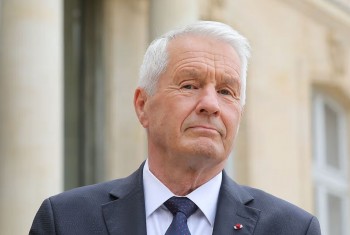What Trump’s Education Policies Mean for You
As President-elect Donald Trump prepares to take office, his proposed policies are sparking discussions about the future of American education. His administration has outlined several major changes that could significantly impact students, teachers, and educational institutions across the nation.
Learn more: How Will Private Schools Benefit from Trump’s Education Policies?
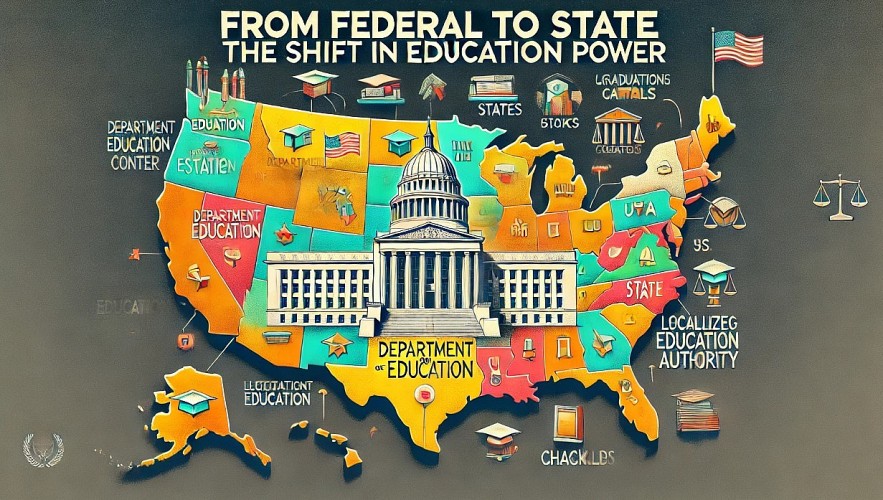 |
| Trump’s Education Policies |
1. Abolishing the Department of Education
One of the most controversial points in Trump’s educational policy is his suggestion to abolish the Department of Education (DOE). Trump has long argued that federal oversight in education is unnecessary and that more control should be given to states and local governments.
Potential Impacts:
- State Control: If the DOE is dismantled, individual states would gain full authority over curriculum, funding allocation, and policy enforcement.
- Reduced Federal Standards: National standards, such as Common Core, may no longer apply, leading to significant variations in education quality across states.
- Funding Concerns: Federal funding programs like Title I, which supports low-income schools, could be at risk if the department is abolished.
Table: Key Federal Education Programs Funded by the DOE
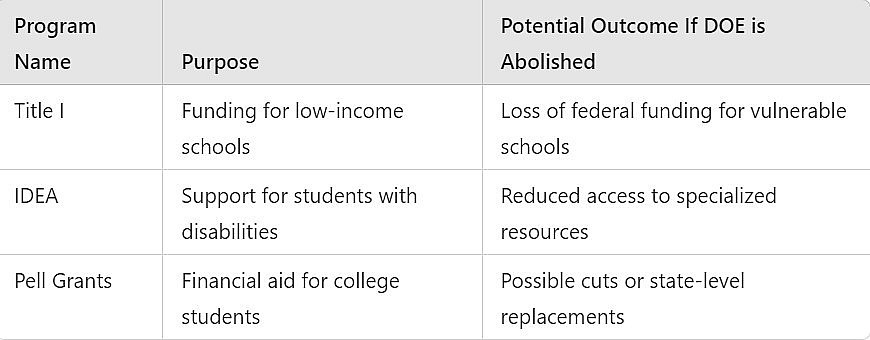 |
2. Gender and Sports Policies: 'Keeping Men Out of Women’s Sports'
Trump has highlighted the importance of maintaining biological distinctions in sports, arguing against transgender athletes competing in women’s divisions. This policy reflects broader conservative views on gender and fairness in sports.
Key Proposals:
- National Ban on Transgender Athletes in Women’s Sports: Trump has vowed to protect women’s sports by ensuring competitors align with their biological sex.
- Impact on Schools and Colleges: Educational institutions receiving federal funding could face stricter regulations regarding athletic programs.
Potential Outcomes:
- Supporters’ View: Many conservatives argue this policy ensures fair competition in sports.
- Critics’ View: Critics claim it marginalizes transgender students and undermines inclusivity.
This policy could lead to legal battles and protests, especially from LGBTQ+ advocacy groups.
3. Student Loan Policies: No Emphasis on Forgiveness
Unlike President Biden, who prioritized student loan forgiveness, Trump’s campaign has not focused on reducing student debt. His approach emphasizes revamping existing loan programs rather than outright forgiveness.
Proposed Changes:
- Encouraging Private Sector Solutions: Trump’s administration is likely to advocate for private-sector involvement in student loans, potentially reducing federal oversight.
- Simplifying Repayment Plans: While not forgiving loans, Trump may streamline repayment processes to make them more manageable.
Possible Consequences:
- Reduced Federal Aid: Students relying on federal forgiveness programs may face difficulties.
- Increased Role of Private Lenders: This could lead to more competition but may also result in higher interest rates for borrowers.
4. Expanding School Choice Programs
A hallmark of Trump’s educational platform is the expansion of school choice programs, which allow parents to use vouchers or tax credits to send their children to private or charter schools.
Key Features:
- Vouchers for Private Schools: Federal funds could be redirected to cover tuition at private schools.
- Support for Charter Schools: Charter schools may receive increased funding and autonomy.
Pros and Cons:
- Advantages: Proponents argue this policy increases competition, improves education quality, and provides more options for families.
- Drawbacks: Critics worry it will divert funds from public schools, harming underfunded districts.
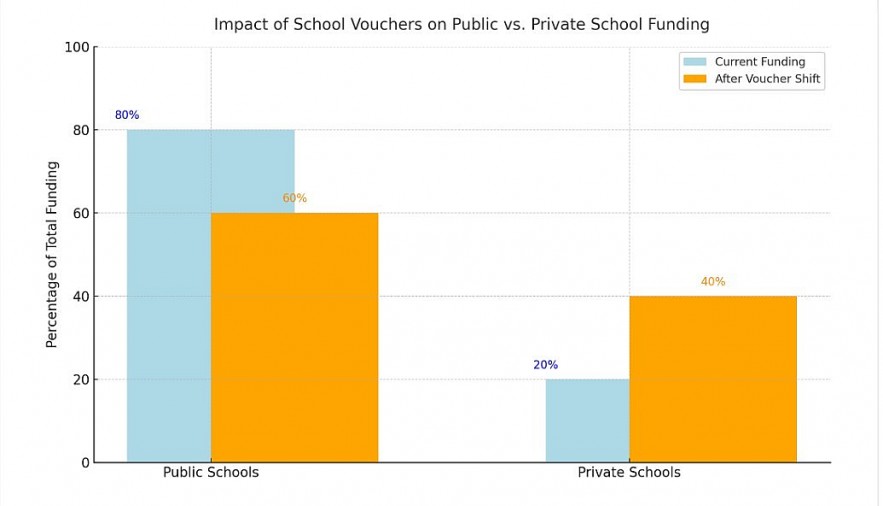 |
| Impact Of School Vouchers On Public Vs. Private School |
5. Curriculum Overhaul and Focus on Patriotic Education
Trump has voiced concerns about the teaching of certain subjects, particularly critical race theory and progressive ideologies in schools. His administration could push for a more “patriotic” curriculum.
Proposed Changes:
- Promoting American Values: Emphasis on traditional American history and achievements.
- Restricting Progressive Curriculums: Schools may face limits on teaching topics like systemic racism or gender theory.
This shift could influence how history, civics, and social studies are taught, potentially sparking debates over academic freedom and bias.
Conclusion
President-elect Trump’s education policies signal significant changes, emphasizing state control, gender-specific sports policies, limited student loan relief, and school choice. While some stakeholders welcome these proposals for promoting competition and decentralization, others fear they may exacerbate inequalities and reduce federal support for vulnerable populations.
Summary Table: Major Changes in Trump’s Education Policies
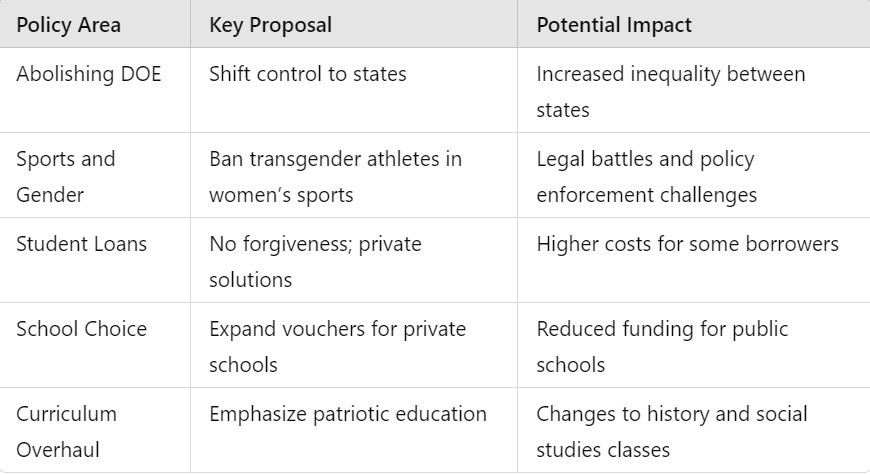 |
As Trump’s administration unfolds, these policies will shape the educational landscape for years to come. Understanding their potential effects is critical for students, parents, and educators alikesition.
 Who is Fabian Hürzeler (Brighton Manager): Biography, Girl Friend, Career, and Net Worth Who is Fabian Hürzeler (Brighton Manager): Biography, Girl Friend, Career, and Net Worth Fabian Hürzeler is the current head coach of Brighton & Hove Albion, the English Premier League club that has been making headlines for their impressive ... |
 Who is Elise Stefanik (Trump Cabinet) - Biography, Personal Life, Career, and Net Worth Who is Elise Stefanik (Trump Cabinet) - Biography, Personal Life, Career, and Net Worth This article delves into Elise Stefanik's life story, including her personal experiences, professional accomplishments, and position as the United States' UN ambassador. |
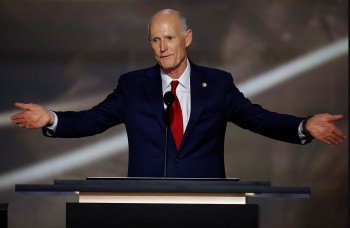 Who is Rick Scott (Top Contender for Senate Majority): Biography, Personal Life, Career Who is Rick Scott (Top Contender for Senate Majority): Biography, Personal Life, Career Rick Scott's early life, personal history, political career, and his chances of becoming Majority Leader in the Senate are all talked about in this article. |
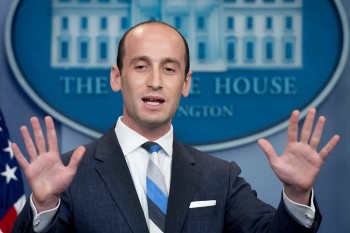 Who is Stephen Miller (Trump Cabinet): Biography, Personal Life, Career, and Net Worth Who is Stephen Miller (Trump Cabinet): Biography, Personal Life, Career, and Net Worth Donald Trump is appointing immigration hardliner Stephen Miller, a longtime adviser, as his new administration's deputy chief of policy. The biography, early years, education, personal ... |
 Who is Lee Zeldin (Trump's Environment Chief) - Military Service, Personal Life, and Career Who is Lee Zeldin (Trump's Environment Chief) - Military Service, Personal Life, and Career President-elect Donald Trump has tapped former Rep. Lee Zeldin to lead the Environmental Protection Agency. This article delves into Zeldin’s background, career, personal life, and ... |









